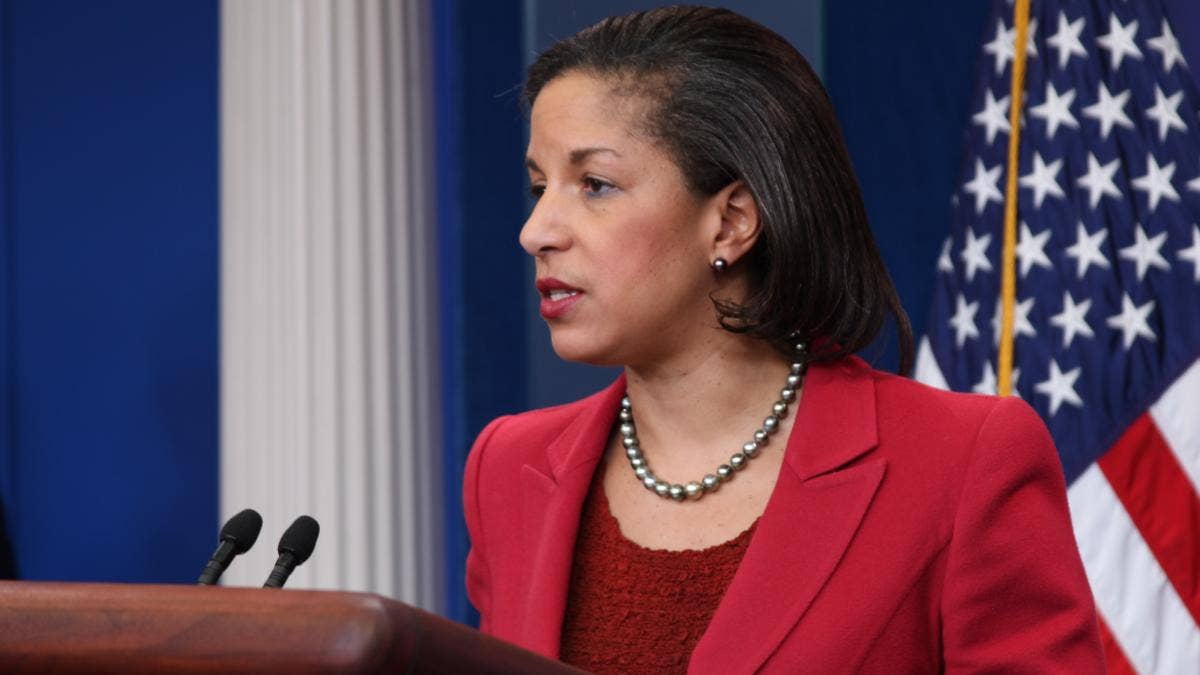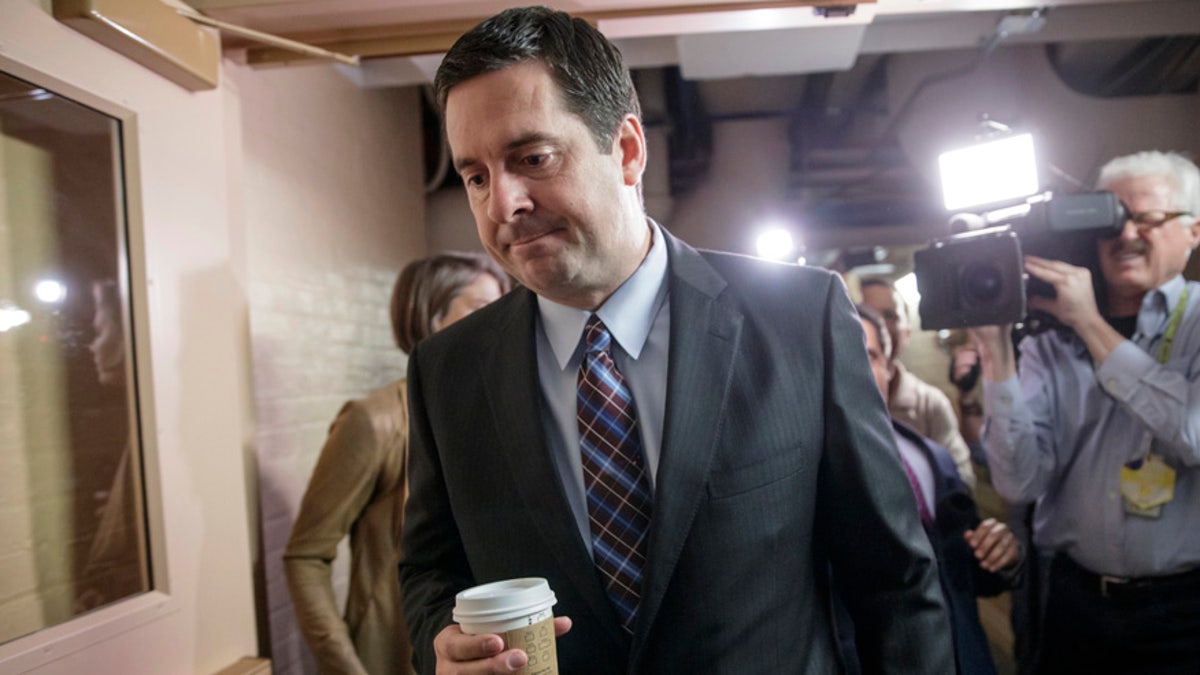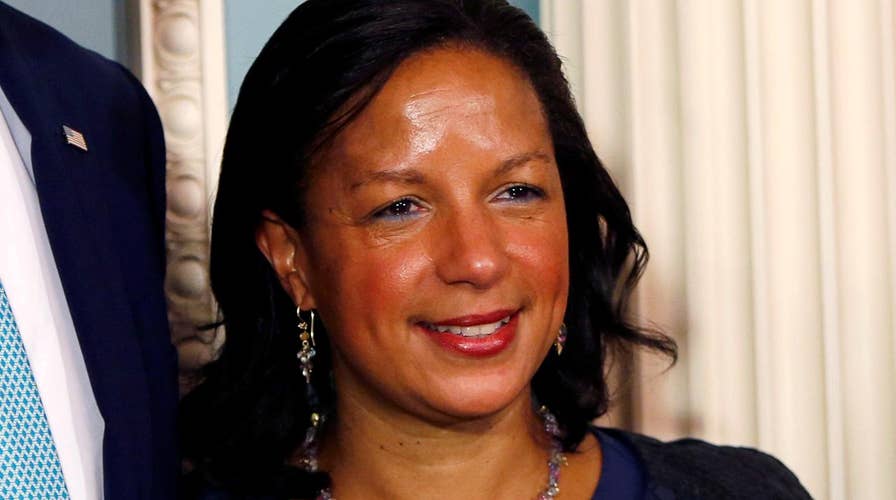Multiple sources tell Fox News that Susan Rice, former national security adviser under then-President Barack Obama, requested to unmask the names of Trump transition officials caught up in surveillance.
The unmasked names, of people associated with Donald Trump, were then sent to all those at the National Security Council, some at the Defense Department, then-Director of National Intelligence James Clapper and then-CIA Director John Brennan – essentially, the officials at the top, including former Rice deputy Ben Rhodes.
The names were part of incidental electronic surveillance of candidate and President-elect Trump and people close to him, including family members, for up to a year before he took office.

Rice was ambassador to the UN when she went on Sunday news shows to say the Benghazi attack was prompted by a video. (Fox News Photo)
It was not clear how Rice knew to ask for the names to be unmasked, but the question was being posed by the sources late Monday.
Such amazing reporting on unmasking and the crooked scheme against us by @foxandfriends. "Spied on before nomination." The real story.
— Donald J. Trump (@realDonaldTrump) April 3, 2017
"What I know is this ... If the intelligence community professionals decide that there’s some value, national security, foreign policy or otherwise in unmasking someone, they will grant those requests," former Obama State Department spokeswoman and Fox News contributor Marie Harf told Fox News' Martha MacCallum on "The First 100 Days." "And we have seen no evidence ... that there was partisan political notice behind this and we can’t say that unless there’s actual evidence to back that up."
White House Press Secretary Sean Spicer, asked about the revelations at Monday’s briefing, declined to comment specifically on what role Rice may have played or officials’ motives.

Rep. Devin Nunes, R-Calif., says he has seen incidental surveillance reports he fears were used for political reasons. (The Associated Press)
“I’m not going to comment on this any further until [congressional] committees have come to a conclusion,” he said, while contrasting the media’s alleged “lack” of interest in these revelations with the intense coverage of suspected Trump-Russia links.
When names of Americans are incidentally collected, they are supposed to be masked, meaning the name or names are redacted from reports – whether it is international or domestic collection, unless it is an issue of national security, crime or if their security is threatened in any way. There are loopholes and ways to unmask through backchannels, but Americans are supposed to be protected from incidental collection. Sources told Fox News that in this case, they were not.
This comes in the wake of Evelyn Farkas’ television interview last month in which the former Obama deputy secretary of defense said in part: “I was urging my former colleagues and, frankly speaking, the people on the Hill – it was more actually aimed at telling the Hill people, get as much information as you can, get as much intelligence as you can, before President Obama leaves the administration.”
Meanwhile, Fox News also is told that House Intelligence Committee Chairman Devin Nunes knew about unmasking and leaking back in January, well before President Trump’s tweet in March alleging wiretapping.
Nunes has faced criticism from Democrats for viewing pertinent documents on White House grounds and announcing their contents to the press. But sources said “the intelligence agencies slow-rolled Nunes. He could have seen the logs at other places besides the White House SCIF [secure facility], but it had already been a few weeks. So he went to the White House because he could protect his sources and he could get to the logs.”
As the Obama administration left office, it also approved new rules that gave the NSA much broader powers by relaxing the rules about sharing intercepted personal communications and the ability to share those with 16 other intelligence agencies.
Rice is no stranger to controversy. As the U.S. Ambassador to the UN, she appeared on several Sunday news shows to defend the adminstration's later debunked claim that the Sept. 11, 2012 attacks on a U.S. consulate in Libya was triggered by an Internet video.
Rice also told ABC News in 2014 that Army Sgt. Bowe Bergdahl "served the United States with honor and distinction" and that he "wasn't simply a hostage; he was an American prisoner of war captured on the battlefield."
Bergdahl is currently facing court-martial on charges of desertion and misbehavior before the enemy for allegedly walking off his post in Afghanistan.













































